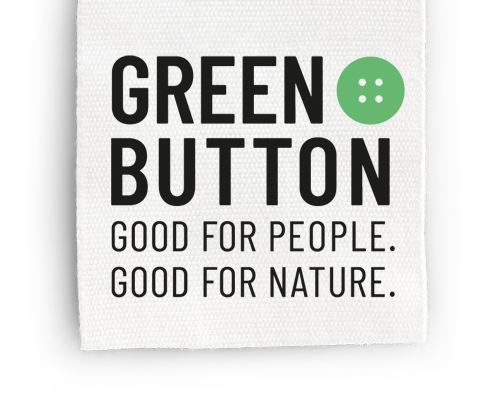The government-run textile label Green Button one year on
A year ago, Germany's Federal Development Minister Gerd Müller and 27 pioneering companies introduced the government-run Green Button certification label. The label offers consumers clear guidance when purchasing socially and environmentally manufactured textiles. Some 52 companies have now signed up to the certification scheme, including some of the very first sustainability pioneers, sport brands, family companies, medium-sized enterprises and large international retailers.
Minister Müller: 'In spite of a difficult economic situation, the Green Button has established itself on the market. I’m delighted that we now have 52 companies on board. We’ve doubled the number in the first year, despite the textile industry being particularly hard hit by the coronavirus crisis. It's now possible to dress head to toe in Green Button products – from hats to T-shirts to training shoes. Bed linen, backpacks and tents are also available certified with the Green Button. The label is available for every taste and all budgets, proving that sustainable fashion doesn’t have to be expensive.’
A representative study by the market research institute GfK concluded that, 'The Green Button is well on the way to becoming a success story.’ Around one third of Germans are familiar with the label which, compared to other sustainability certification labels, is a very good result after just a year. And virtually all those asked were in favour of a government-run certification label for monitoring social and environmental standards. People also know what the Green Button stands for – prohibiting child labour and dangerous chemicals and paying a minimum wage.
This trust is reflected at the shop counter: In the first half of 2020, which was a difficult economic period, more than 50 million textiles with the Green Button were sold, including 35 million items of clothing. Extrapolating the data, that gives the Green Button a market share of between 1.5 and 3 per cent. By way of comparison: In the first year after its introduction, Germany’s ‘Bio’ organic certification label had a 2-per cent market share, climbing to 3.5 per cent after seven years.
Minister Müller went on to say that, 'The Green Button is more than a textile label – it’s a symbol of our responsibility. We need a fundamental shift towards more sustainability in global supply chains. Many of our products are produced by people who up to now could barely live off what they earn. Today, some 75 million children worldwide still have to labour under exploitative conditions – and they do so for our products, too. More and more customers don’t want to accept this anymore and are demanding that producers comply with basic minimum standards. The companies participating in the Green Button label already do that. And so, one year on, the Green Button is also a blueprint for cross-sector supply chain legislation. This label shows that it can work. Even small startups can do it.'
Social welfare organisations Diakonie Deutschland and Caritas Germany are now also supporting sustainable textiles. The two organisations are the largest textile purchasers in Germany outside the public sector. For the 2.2 million beds and spaces in their 56,000 facilities alone, they require huge amounts of bed linen. On the first anniversary of the Green Button, 9 September 2020, Germany's Development Minister Gerd Müller and the President of Diakonie Deutschland, Ulrich Lilie, together with the Secretary General of Caritas Germany, Hans Jörg Millies, signed an agreement.
Müller said he was pleased that Diakonie and Caritas are supporting the Green Button, adding that private and public institutions can make a major contribution to fair supply chains through consistent sustainable procurement. He explained that, ‘The concept of Christian charity also applies to the people at the start of the supply chain, like the garment industry workers in Bangladesh who sew our products on a piecework basis.’
(Source: http://www.bmz.de/20200909-1)

